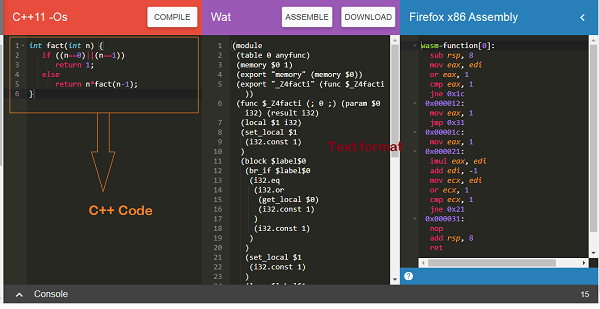WebAssembly - Utilisation de Nodejs
Javascript a un tas d'API qui peuvent fonctionner avec du code wasm. L'API est également prise en charge dans nodejs.
Installez NODEJS sur votre système. Créez un fichier Factorialtest.js.
Utilisons le code factoriel C ++ comme indiqué ci-dessous -
int fact(int n) {
if ((n==0)||(n==1))
return 1;
else
return n*fact(n-1);
}Ouvrez Wasm Explorer, disponible sur https://mbebenita.github.io/WasmExplorer/ comme indiqué ci-dessous -

La première colonne a la fonction factorielle C ++, la deuxième colonne a le format de texte WebAssembly et la dernière colonne a le code d'assemblage x86.
Le format de texte WebAssembly est le suivant -
(module
(table 0 anyfunc)
(memory $0 1)
(export "memory" (memory $0))
(export "_Z4facti" (func $_Z4facti))
(func $_Z4facti (; 0 ;) (param $0 i32) (result i32)
(local $1 i32)
(set_local $1(i32.const 1))
(block $label$0
(br_if $label$0
(i32.eq
(i32.or
(get_local $0)
(i32.const 1)
)
(i32.const 1)
)
)
(set_local $1
(i32.const 1)
)
(loop $label$1
(set_local $1
(i32.mul
(get_local $0)
(get_local $1)
)
)
(br_if $label$1
(i32.ne
(i32.or
(tee_local $0
(i32.add
(get_local $0)
(i32.const -1)
)
)
(i32.const 1)
)
(i32.const 1)
)
)
)
)
(get_local $1)
)
)Le fait de la fonction C ++ a été exporté sous la forme "_Z4facti»Au format texte WebAssembly.
Factorialtest.js
const fs = require('fs');
const buf = fs.readFileSync('./factorial.wasm');
const lib = WebAssembly.instantiate(new Uint8Array(buf)).
then(res => {
for (var i=1;i<=10;i++) {
console.log("The factorial of "+i+" = "+res.instance.exports._Z4facti(i))
}
}
);Dans votre ligne de commande, exécutez le noeud de commande factorialtest.js et le résultat est le suivant -
C:\wasmnode>node factorialtest.js
The factorial of 1 = 1
The factorial of 2 = 2
The factorial of 3 = 6
The factorial of 4 = 24
The factorial of 5 = 120
The factorial of 6 = 720
The factorial of 7 = 5040
The factorial of 8 = 40320
The factorial of 9 = 362880
The factorial of 10 = 3628800